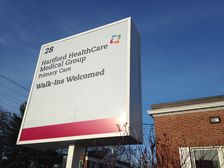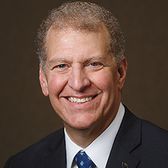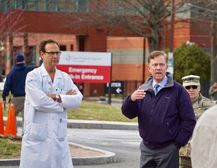Processing Your Payment
Please do not leave this page until complete. This can take a few moments.
- News
-
Editions
View Digital Editions
Biweekly Issues
- May 13, 2024
- April 29, 2024
- April 15, 2024
- April 1, 2024
- March 18, 2024
- March 4, 2024
- February 19, 2024
- February 5, 2024
- January 22, 2024
- + More
Special Editions
- Lists
- Viewpoints
- HBJ Events
- Business Calendar
- Custom Content
St. Francis Hospital’s Burke to oversee $280M campus renovation plan
 Photo | Contributed
Thomas Burke.
Photo | Contributed
Thomas Burke.
More Information
St. Francis Hospital and Medical Center President Thomas Burke is ready to start looking past the pandemic and toward a period of significant expansion at the Hartford-based care provider.
While the pandemic forced St. Francis to reassess its strategy and affected staff — who were working more hours than usual — Burke said the future is bright as the hospital gets ready to launch a multiyear, $280 million campus improvement plan.
The three- to five-year plan will be done over several phases and include adding new urgent care centers, refurbishing older buildings on the hospital’s 617-bed campus and, in some cases, new construction. A new epilepsy monitoring unit is planned in addition to expanded telehealth offerings.
The centerpiece of the investment will be a new patient care tower, said Burke. It will be located on St. Francis’ main campus and host the 125-year-old hospital’s new women and infants center of excellence, which will provide labor and delivery services, an intensive care nursery and, potentially, an ambulatory birthing center.
St. Francis Hospital, which is part of the larger Trinity Health of New England system, currently owns and operates seven buildings encompassing 2.4 million square feet.
“We began a lot of these campus and strategic plans prior to the pandemic,” said Burke, who was named vice president of operations at the hospital in early 2016, prior to being elevated to permanent president in Nov. 2020. “The one thing the pandemic allowed us to do was to hit pause and re-imagine the plan. Part of that plan is our ambulatory strategy.”
Virtual care uptick
St. Francis Hospital’s growth plan is already under way. On Nov. 1, Trinity Health opened an ambulatory care center in Rocky Hill, and up to six more will be introduced in the region in the coming months and years, Burke said.
“They are primary care and they will have rotating specialists such as a cardiologist one day and a neurologist another day,” said the 49-year-old Burke, a Philadelphia native who started his career as a hospital pharmacist in the City of Brotherly Love.
Telehealth services also skyrocketed during the pandemic.
While Burke said St. Francis offered telehealth on a limited basis prior to the pandemic, COVID-19 changed everything.
“We saw a big uptick in virtual care,” he said. “The numbers came down a little since the initial [COVID] wave, but the pandemic forced our hand. We began doing virtual care quickly because that is what the community needed. Health care, sometimes, is slow to become current. Because of the pandemic, we had no choice but to move.”
Telehealth, Burke said, is here to stay and St. Francis will be adding virtual services, including an online scheduling component for remote and in-person primary care appointments.
“It’s so important because you can get access to providers during hours you could not previously get, like weekends and evenings,” he said.
Despite the growth prospects, Burke acknowledged the last year-plus has presented significant challenges, with “pressures coming at us from all sides.”
During the height of the pandemic, the staff was working significantly more hours, and there were layoffs and furloughs, although everyone was later offered their job back. The hospital currently employs about 2,000 people, he said.
St. Francis received $40.6 million in federal pandemic aid early in the crisis and that, Burke said, helped make up for some shortfalls. All hospitals were negatively impacted financially early on during the pandemic because they had to postpone or cancel elective surgeries, which are a key revenue stream.
Those elective procedures came back to more normal levels in 2021.
The first wave of the pandemic — during the spring of 2020 — brought about 150 COVID patients to the hospital on any given day, Burke said. He said that number fell to fewer than 100 COVID patients in future waves but “the second and third waves were no less challenging.”
The staff, he added, was affected in many ways by the pandemic.
“With regard to the mental health aspect, we are doing a number of things [to help our workers],” Burke said. “We are bringing support services on board and are providing resiliency rooms where staff can go and take a few minutes for some meditation, or to sit in a massage chair. We think it’s important and see the value of that.”
The hospital during the year also implemented a vaccine mandate for its workers, following in the footsteps of most other in-state care providers.
In addition, Burke said, management asked the staff what they’d like to see implemented moving forward.
“Greater flexibility with scheduling” was a common concern that will be addressed, he said.
“We have to be flexible,” the president said. “We have to understand — whether it’s children in school or caring for parents — that there are a multitude of challenges our colleagues are faced with. Our staff has been through a lot the past 18 months, so we are focusing on supporting them in any way we can.”
Thomas Burke
President
St. Francis Hospital and Medical Center
Education: Bachelor’s degree, Philadelphia College of Pharmacy; MBA, St. Joseph’s University (Philadelphia)
Age: 49
This story is part of our 5 We Watched recap. Click here to see other profiles part of this series.
Related Content

2022 Giving Guide
This special edition informs and connects businesses with nonprofit organizations that are aligned with what they care about. Each nonprofit profile provides a crisp snapshot of the organization’s mission, goals, area of service, giving and volunteer opportunities and board leadership.
Learn more
Subscribe
Hartford Business Journal provides the top coverage of news, trends, data, politics and personalities of the area’s business community. Get the news and information you need from the award-winning writers at HBJ. Don’t miss out - subscribe today.
Subscribe
2024 Book of Lists
Delivering Vital Marketplace Content and Context to Senior Decision Makers Throughout Greater Hartford and the State ... All Year Long!
Read Here-
2022 Giving Guide
This special edition informs and connects businesses with nonprofit organizations that are aligned with what they care about. Each nonprofit profile provides a crisp snapshot of the organization’s mission, goals, area of service, giving and volunteer opportunities and board leadership.
-
Subscribe
Hartford Business Journal provides the top coverage of news, trends, data, politics and personalities of the area’s business community. Get the news and information you need from the award-winning writers at HBJ. Don’t miss out - subscribe today.
-
2024 Book of Lists
Delivering Vital Marketplace Content and Context to Senior Decision Makers Throughout Greater Hartford and the State ... All Year Long!
ABOUT
ADVERTISE
NEW ENGLAND BUSINESS MEDIA SITES
No articles left
Get access now
In order to use this feature, we need some information from you. You can also login or register for a free account.
By clicking submit you are agreeing to our cookie usage and Privacy Policy
Already have an account? Login
Already have an account? Login
Want to create an account? Register
Get access now
In order to use this feature, we need some information from you. You can also login or register for a free account.
By clicking submit you are agreeing to our cookie usage and Privacy Policy
Already have an account? Login
Already have an account? Login
Want to create an account? Register








0 Comments